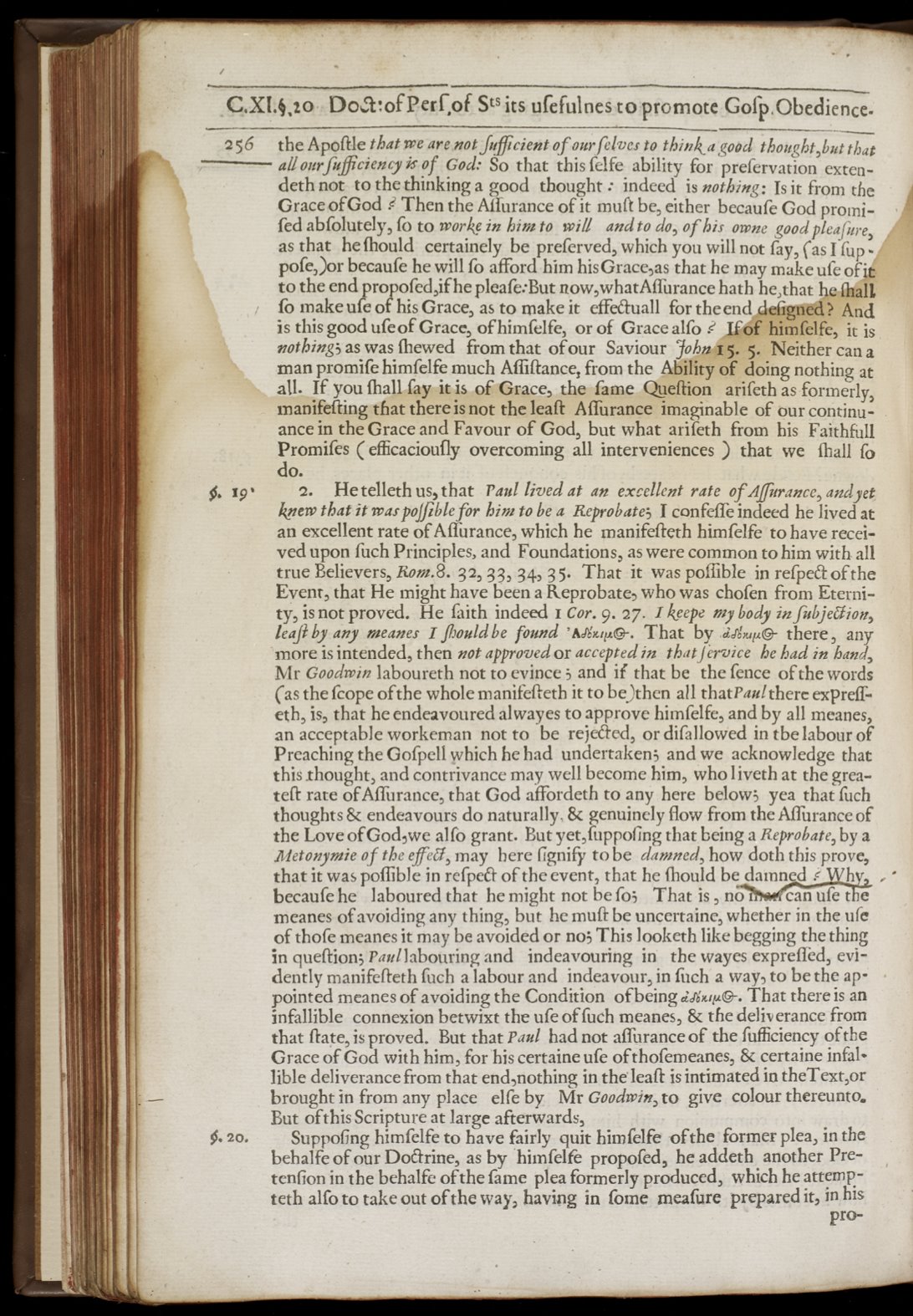

Ç.X1.4,2o'
Doa%fPerfof
Sts
its
ufefulnes
to
promote
Gofp.Obedience-
256
the
Apoftle
that
we
are
not
fufcient
of
our
felves
to
thinka
goad thought,but
that
all
ourfufficiency is
of
God: So
that
this
felfe
ability for prefervation exten-
deth
not to the thinking
a
good
thought
: indeed
is
nothing:
Is
it
from the
Grace
ofGod
?
Then
the
Affurance
of
it mutt be, either
becaufe God
promi-
fed
abfolutely,
fo
to
worke
in
him
to
will
and
to do;
o
f
his
ozone
goodpleafure,
as
that
he fhould certainely
be
preferved,
which you will not
fay,
(as
I fup
pofe,)or
becaufe
he
will fo afford him
hisGrace,as
that
he
may
make
ufe
cf
it
to the
end propofed,if he pleafe:
But now,whatAffprance
hath he,that
he (hall
fo make ufe
of
his
Grace,
as
to
make it
effe&uall
for
the end
deigned?
And
is this
good
ufeof
Grace,
of
himfelfe,
or
of
Grace
alfo ?
If
of
himfelfe, it
is
nothing;
as
was (hewed
from
that
of
our
Saviour
John
as.
5.
Neither
can
a
man
promife himfelfe much
Afiifiance,
from
the
Ability
of
doing nothing
at
all.
If
you
shall fay
it
is
of
Grace,
the
fame Queftion arifeth
as
formerly,
manifetling
that
there
is
not the
leaf}
Affurance imaginable
of
our continu-
ance in
the
Grace and Favour
of
God,
but
what arifeth
from
his
Faithfúll
Promifes
(
efhcacioufly
overcoming all interveniences
)
that
we (hall fo
do.
4.
19'
2.
He telleth
us,
that
Paul
lived
at
an excellent
rate
offl_ffurance,andyet
knew
that it
was
poffible
for
him
to
be
a
Reprobates
I
confeffe
indeed he lived at
an
excellent
rate
of
Affurance, which he manifefteth himfelfe
'to
have recei-
ved upon
fuch Principles,
and Foundations,
as
were common
to
him
with
all
true
Believers,
Rom.8. 32,
33, 34,
35.
That
it
was
poffible
in
refpe
of
the
Event, that
He might have been
a
Reprobate,
who
was chofen
from
Eterni-
ty,
is
not proved. He
faith indeed
t
Cor.
9. 27.
I
keepe my body
infubjetlion,
leaflby.any
meanes
I
fhould
be
found
'A&qLg-.
That
by
,.14,,P@
there,
any
more
is
intended, then
not
approved
or
accepted
in that
firvice
he
had in
band,
Mr
Goodwin
laboureth not to
evince;
and
if
that
be
the
fence
of
the
words
(as
the
fcope
ofthe
whole manifefteth it
to be)then
all
thatPaulthere
expreff-
eth,
is,
that
he endeavoured
alwayes
to
approve
himfelfe,
and by
all meanes,
an acceptable workeman not
to
be reje&ed,
or
difallowed
in
the
labour
of
Preaching the Gofpell
which he
had undertaken; and
we acknowledge
that
this
thought,
and contrivance
may well
become him, who
l
iveth
at
the
grea-
teft rate
ofAfï'urance,
that
God affordeth
to
any here below; yea
that
fuch
thoughts
&
endeavours
do naturally,
& genuinely
flow
from
the
Affurance
of
the
Love
ofGod,we
alfo grant. Butyet,fuppofing
that
being
a Reprobate,
by
a
Metonymie
of
the
eielf,
may
here
Ggnify
to
be
damned,
how
doth
this prove,
that
it
was poffible
in refpe&
of
the event,
that
he should
be damned
?
h
becaufe he laboured
that
he
might not
be fo;
That
is
,
no
can
meanes
of
avoiding any
thing,
but
he mufi be uncertaine,
whether
in
the
ufe
of
thofe
meanes
it
may be
avoided
or
no This looketh like begging the
thing
in queftion; Paullabouring and indeavouring
in
the
wayes
expreffed, evi-
dently
manifefteth
fuch
a
labour and indeavour,
in
fuch
a way,
to
be the
ap-
pointed
meanes
of
avoiding
the
Condition
ofbeing
ád'
i
-.
That
there
is
an
infallible connexion
betwixt the
ufe
of
fuch
meanes, &
the
deliverance
from
that
fiate,
is
proved.
But
that
Paul
had
not
afl'urance
of
the
fufficiency
of
the
Grace
of
God with him, for
his
certaine
ufe
ofthofemeanes,
& certaine
infal-
lible
deliverance from
that
end,nothing
in
the
leaft
is
intimated
in
theText,or
brought
in
from any place
elfe
by Mr
Goodwin,
to
give colour thereunto.
But
ofthis
Scripture
at large afterwards,
4.20.
Suppofing himfelfe
to
have
fairly
quit
himfelfe
ofthe
former plea,
in the
behalfe
of
our
Do
&rine,
as
by
himfelfe
propofed,
he
addeth another
Pre
-
tenGon
in
the
behalfe
of
the
fame plea formerly
produced,
which he
attenip-
teth
alfo
to
take out
of
the
way, having in fome meafure prepared it,
in
his
pro-










